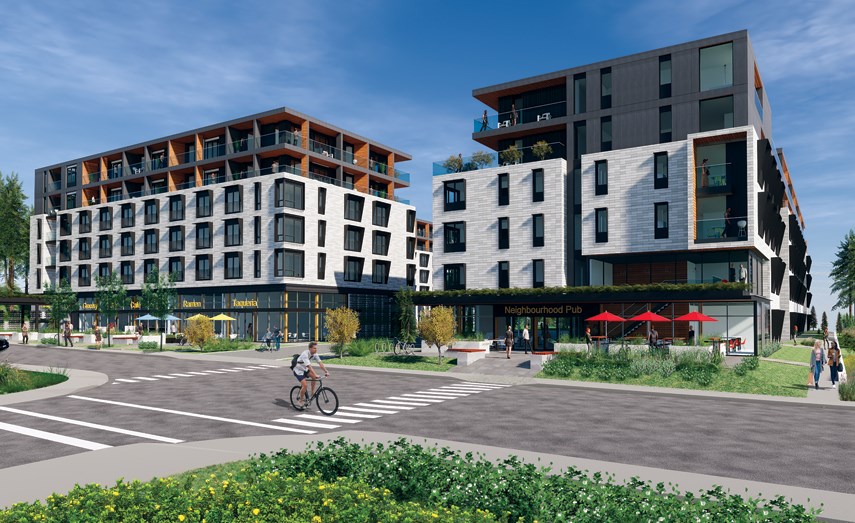This article has been amended to include a statement from CMHC.
Faced with more students than student housing, Capilano University is backing a 330-unit development just off campus – and just outside the District of North Vancouver’s official community plan.
During an informal meeting Monday evening, district council debated swapping the dog kennel and dog daycare at 1310 Monashee Dr. in favour of Darwin development company’s proposed pair of six-storey rental buildings housing CapU’s students, faculty and staff.
“It seems to me that this is progress,” Coun. Jim Hanson said. “Here we have a situation where our housing goals and our transportation goals actually align.”
Located east of the school’s northern transit exchange, the development could reduce traffic congestion and increase the number of students commuting by walking paths, agreed university president Paul Dangerfield in a letter supporting the project.
“Time spent out of the car is time for study and for wellness – both of which contribute to the quality of life in North Vancouver,” Dangerfield wrote.
But while the location was a feature for Hanson, it was a bug for Coun. Megan Curren.
“I really question this location,” she said. “The student housing should be a non-profit endeavour on the property.”
Coun. Mathew Bond disagreed. “This is currently dog Airbnb,” he said. “We can do much better.”
A student working a minimum wage job for 20 hours a week could afford to pay rent of $360 a month, Curren said. There’s “no way” the rents will be close to that level, she added.
Capilano Students’ Union president Emily Bridge also voiced concern about rental rates. “Students continue to struggle to afford the unrealistic cost of living on the North Shore and Metro Vancouver,” she stated in a release. “While we hope this development will meet the needs of students, we would like to see some concrete numbers.”
The project could be partially subsidized by the Canada Mortgage and Housing Corp. – meaning total residential rental income would have to be 10 per cent below the top achievable level. Additionally, 20 per cent of the units would have to be discounted by 30 per cent based on a formula using median household income. CMHC is in the preliminary stages of studying the project to see if it meets critera for financing, stated CMHC media officer Len Catling.
Given that median income in the district is $104,000, Coun. Betty Forbes suggested even reduced rents could be beyond students’ means.
“Affordability is a concern,” Bond agreed. “But in this neighbourhood specifically, and for students and staff at the university, availability is just as much of a problem.”
In a 2019 university survey, 87 of 127 CapU employees said either the high cost of housing or the dearth of availability kept them from living closer to campus.
Slightly more than half of the project’s 330 units would be affordable – costing no more than 30 per cent of pre-tax income – for CapU staffers in single-income households, according to a report from Darwin. For staff with dual household incomes, 85 per cent of the units will be affordable.
While suggesting the rents might be more high end than council wants, Coun. Jordan Back was generally supportive, suggesting the project could be “the start of a nice community.”
The project includes 217 parking spots, which would serve tenants as well as the pubs, restaurants, cafes or grocery stores that would occupy the project’s 17,060 square feet of commercial space.
“Why would you need that many parking spots if long term it truly is meant to remain as student housing?” asked Coun. Lisa Muri. “Or, are we starting off at student housing and if we don’t get an uptake ... then does it turn into market rental?”
Muri also suggested the project wouldn’t be affordable for students. “We can’t afford it, and we all work full time,” she said.
Hanson emphasized the project is on private land. “If we’re talking about prohibition of profit on private land ... that, perhaps, doesn’t make a whole lot of sense,” he said.
If council rejects Darwin’s proposal they could end up with a development “that doesn’t serve the needs in any way of CapU,” Hanson concluded.
CapU’s leased dormitories at 2420 Dollarton Hwy. are full with demand exceeding capacity, Dangerfield stated.
The school’s plan is to build 1,000 new units of housing over the next five to 10 years, which is an “essential component” of the school’s ability to attract and retain students, according to Dangerfield.
Situated on a nearly three-acre site, the project’s floor space ratio – which measures a building’s total floor space against its lot size – is 1.76.
“It must be entirely to the benefit of the university or I’m not interested in these kinds of densities on this space,” said Mayor Mike Little.
While Little joined some councillors in expressing concern about the property’s steep slope, he disagreed on the subject of market rents.
“It’s not market rates competing with someone making $170,000 working downtown,” he explained. “It’s competing with market rates amongst the student body, the faculty and the staff.”
Darwin’s application needs further review by district staff before it can come before council for first reading.
In December 2017, council voted to give third reading to 184 housing units at 1923-1959 Purcell Way in concert with 60 micro-suites in a university-owned building on Greg Lee Way. However, the project hasn’t received final adoption and is not scheduled for council consideration.



